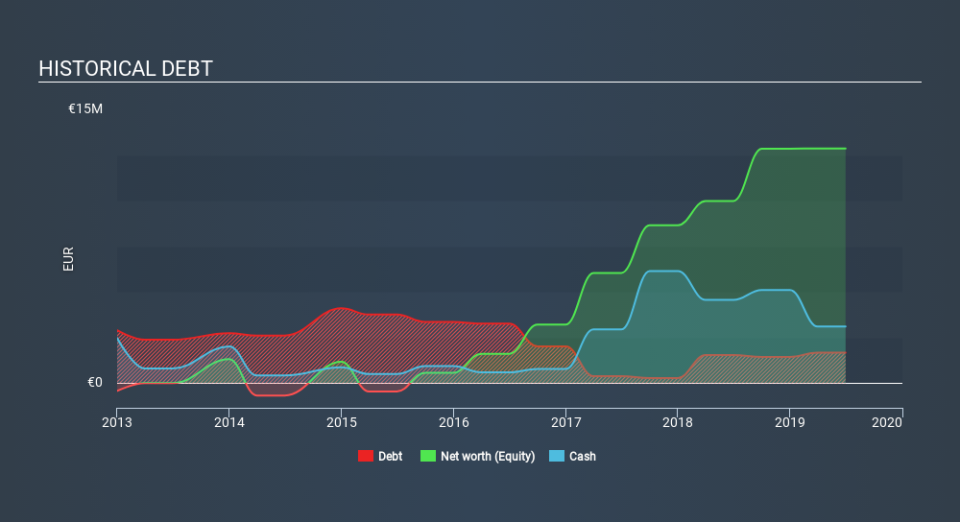Here's Why Alexanderwerk (FRA:ALX) Can Manage Its Debt Responsibly

Warren Buffett famously said, 'Volatility is far from synonymous with risk.' So it might be obvious that you need to consider debt, when you think about how risky any given stock is, because too much debt can sink a company. We can see that Alexanderwerk Aktiengesellschaft (FRA:ALX) does use debt in its business. But the real question is whether this debt is making the company risky.
What Risk Does Debt Bring?
Debt is a tool to help businesses grow, but if a business is incapable of paying off its lenders, then it exists at their mercy. In the worst case scenario, a company can go bankrupt if it cannot pay its creditors. However, a more frequent (but still costly) occurrence is where a company must issue shares at bargain-basement prices, permanently diluting shareholders, just to shore up its balance sheet. Having said that, the most common situation is where a company manages its debt reasonably well - and to its own advantage. The first thing to do when considering how much debt a business uses is to look at its cash and debt together.
See our latest analysis for Alexanderwerk
What Is Alexanderwerk's Debt?
As you can see below, at the end of June 2019, Alexanderwerk had €1.68m of debt, up from €1.54m a year ago. Click the image for more detail. However, it does have €3.10m in cash offsetting this, leading to net cash of €1.42m.
A Look At Alexanderwerk's Liabilities
Zooming in on the latest balance sheet data, we can see that Alexanderwerk had liabilities of €6.19m due within 12 months and liabilities of €3.57m due beyond that. Offsetting this, it had €3.10m in cash and €3.97m in receivables that were due within 12 months. So its liabilities total €2.68m more than the combination of its cash and short-term receivables.
Of course, Alexanderwerk has a market capitalization of €33.8m, so these liabilities are probably manageable. But there are sufficient liabilities that we would certainly recommend shareholders continue to monitor the balance sheet, going forward. While it does have liabilities worth noting, Alexanderwerk also has more cash than debt, so we're pretty confident it can manage its debt safely.
In addition to that, we're happy to report that Alexanderwerk has boosted its EBIT by 51%, thus reducing the spectre of future debt repayments. There's no doubt that we learn most about debt from the balance sheet. But it is Alexanderwerk's earnings that will influence how the balance sheet holds up in the future. So when considering debt, it's definitely worth looking at the earnings trend. Click here for an interactive snapshot.
Finally, a business needs free cash flow to pay off debt; accounting profits just don't cut it. Alexanderwerk may have net cash on the balance sheet, but it is still interesting to look at how well the business converts its earnings before interest and tax (EBIT) to free cash flow, because that will influence both its need for, and its capacity to manage debt. Looking at the most recent three years, Alexanderwerk recorded free cash flow of 33% of its EBIT, which is weaker than we'd expect. That's not great, when it comes to paying down debt.
Summing up
We could understand if investors are concerned about Alexanderwerk's liabilities, but we can be reassured by the fact it has has net cash of €1.42m. And we liked the look of last year's 51% year-on-year EBIT growth. So we don't think Alexanderwerk's use of debt is risky. Another positive for shareholders is that it pays dividends. So if you like receiving those dividend payments, check Alexanderwerk's dividend history, without delay!
If, after all that, you're more interested in a fast growing company with a rock-solid balance sheet, then check out our list of net cash growth stocks without delay.
If you spot an error that warrants correction, please contact the editor at editorial-team@simplywallst.com. This article by Simply Wall St is general in nature. It does not constitute a recommendation to buy or sell any stock, and does not take account of your objectives, or your financial situation. Simply Wall St has no position in the stocks mentioned.
We aim to bring you long-term focused research analysis driven by fundamental data. Note that our analysis may not factor in the latest price-sensitive company announcements or qualitative material. Thank you for reading.


